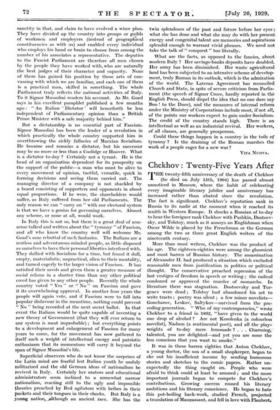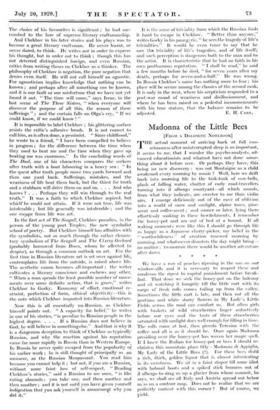Chekhov : Twenty-Five Years After
THE twenty-fifth anniversary of the death of Chekhov (he died on July 15th, 1904) has passed almost unnoticed in Moscow, where the habit of celebrating every imaginable literary jubilee and anniversary has increased rather than abated since the revolution. The fact is significant. Chekhov's reputation sank in Russia to its nadir at the moment when it reached its zenith in Western Europe. It shocks a Russian of to-day to hear the foreigner rank Chekhov with Pushkin, Dostoev- sky, and Tolstoy, much as it annoys an Englishman when Oscar Wilde is placed by the Frenchman or the German among the two or three great English writers of the nineteenth century.
More than most writers, Chekhov was the product of his age. The eighteen-eighties were among the gloomiest and most barren of Russian history. The assassination of Alexander II. had produced a situation which excluded reasonable men from justification in politics or political thought. The conservative preached repression of the last vestiges of freedom in speech or writing ; the radical condoned or approved the murder of monarchs. In literature there was stagnation. Dostoevsky and Tur- genev were dead ; Tolstoy had abandoned his art to write tracts ; poetry was silent ; a few minor novelists- Goncharov, Leskov, Saltykov—survived from the pre- ceding generation. " Who of my contemporaries," wrote Chekhov to a friend in 1892, "have given to the world one drop of alcohol ? Are not Korolenka (a colourless novelist), Nadson (a sentimental poet), and all the play.' wrights of to-day mere lemonade ? . . . Charming; talented, you are delighted—and yet you are none the less conscious that you want to smoke."
It was in these barren eighties that Anton Chekhov, a young doctor, the son of a small shopkeeper, began to eke out his insufficient income by sending humorous stories and sketches to the comic papers. Rather un- expectedly the thing caught on. People who were afraid to think could at least be amused ; and the more important journals began to compete for Chekhov's contributions. Growing success roused his literary ambitions and his literary conscience. He began to hate this pot-boiling hack-work, studied French, projected a translation of Maupassant, and fell in love with Flaubert; The choice of his favourites is significant ; he had suc- cumbed to the lure of supreme literary craftsmanship.
And Chekhov in his later stories and his plays was to become a great literary craftsman. He never learnt, or never dared, to think. He writes not in order to express his thought, but in order not to think ; though this has not deterred distinguished foreign, and even- Russian, critics from writing theses on Chekhov as a thinker. The philosophy of Chekhov is negation, the pure negation that denies even itself.- He. will not call himself an agnostic. For agnosticism implies knowledge that nothing can be known ; and perhaps after all something can be known, and it is our fault or our misfortune that we have not yet found it out. " The time will come," says Irene, in the last scene of The Three Sisters, " when everyone will discover- the purpose of all this, the reason of these sufferings " ; and the curtain falls on- Olio's cry, " If we could know, if we could knoW ! "
It is impossible to label Chekhov ; his glittering surface resists the critic's adhesive brush. It is not correct to call him, as is often done, a pessimist. " Since childhood," he wrote to a friend, " r have been compelled to believe in progress ; for the difference between the time when they used to beat me and the time when they gave up beating me was enormous." In the concluding words of The Duel, one of his characters compares the seekers after truth with a boat labouring in a heavy sea : " In the quest after truth people move two yards forward and then one yard back. Sufferings, mistakes, and the weariness of life beat them hack, but the thirst for truth and a stubborn will drive them on and On. . . . And who knows ? . . . Perhaps they will win through to the real truth." It was a faith to which Chekhov aspired, but whieli he could not attain. If it were not true, life was intolerable ; but life generally was intolerable ; and the one escape from life was art.
In the first act of The Seagull, Chekhov parodieS, in the person of the young poet Treplev, the new symbolist school of poetry. But Chekhov himself has affinities with the symbolists, not so much through the rather elemen- tary symbolism of The Seagull and The Cl:erry Orchard (probably borrowed from Ibsen, whom he affected to despise), as through a common outlook on art. For the first time in Russian literature art is set over against life, contemplates life from the outside, is raised above life. The aesthetic canon becomes all-important ; the writer cultivates a literary conscience and eschews any other. " When a man spends the least possible number of move- ments over some definite action, that is grace," writes Chekhov to Gorky. Economy of effort, emotional re- straint, perfection of form, ethical objectivity—this is the note which Chekhov imported into Russian literature.
Now this is all essentially un-Russian, as Chekhov himself points out. " A capacity for belief," lie writes in one of his stories, "is peculiar to Russian people in the highest degree. . . . If a Russian does not believe in God, he will believe in something else." And that is why it is a dangerous deception to think of Chekhov as typically Russian, and why the reaction against his reputation came. far more rapidly in Russia than in Western Europe. In Russia he never quite escaped from the popularity of his earlier work ; he is still thought of principally as an amuseur, as the Russian Maupassant. You read him because you cannot help it ; - but not, if you are a Russian, without some faint loss of self-respect. " Reading Chekhov's stories," said a Russian to me once, " is like eating almonds ; . you take one, and then another and then another.; and it is not until you have given yourself indigestion that you ask yourself in amazement why you did it." . It is the sense of triviality from which the Russian finds it .hard to escape in Chekhov. " Better than anyone," writes Gorky in his panegyric, " lie sees the tragedy of life's trivialities." It would be even truer to say that he saw the triviality of life's tragedies, and of life itself; and such perception is dangerous both to the man and to the artist. It is characteristic that he had no faith in his own posthumous reputation. " I shall be read," lie said a few months before he died, " for seven years after my death, perhaps for seven-and-a-half." He was wrong. In Russia Chekhov's name has nothing more to fear ; his place will be secure among the classics of the second rank. It is only in the west, where his seepticisM responded to a post-war mood of weariness and disillusionment, and where he has been raised on a pedestal incommensurate with his true stature, that the balance remains to be .

















































 Previous page
Previous page